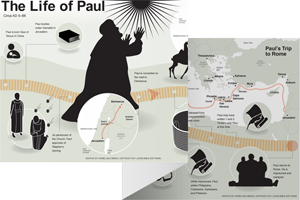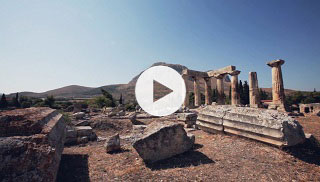1:1–9 Paul founded the church at Corinth during his second missionary journey (probably between ad 50–51). Paul likely wrote the letter known as 1 Corinthians in ad 54–55 after he had received a report concerning the Corinthian believers quarreling (see note on 1 Cor 1:11) and a letter from them that raised questions about spiritual gifts, collections, and marriage. The work now called 1 Corinthians is actually (at least) Paul’s second letter to the Corinthians; there is not a known copy of the letter mentioned in 5:9. |
1:1 Paul The apostle formerly known as Saul of Tarsus.
 Paul: A Life of Redemption and Transformation
Paul: A Life of Redemption and Transformation
an apostle See note on Rom 1:1.
 Pauline Self-Designations Table
Pauline Self-Designations Table
through the will of God Paul’s appointment to the office of apostle was God’s decision, not a person’s or group’s. Paul doesn’t need the affirmation of the Corinthians because God chose him.
was God’s decision, not a person’s or group’s. Paul doesn’t need the affirmation of the Corinthians because God chose him.
Sosthenes He may be the synagogue leader Sosthenes,
may be the synagogue leader Sosthenes, who was beaten in front of the judgment seat while Paul was in Corinth (Acts 18:17).
who was beaten in front of the judgment seat while Paul was in Corinth (Acts 18:17).
1:2 church The Greek word used here, ekklēsia, refers to a gathering of people, not a building; here, it references the gathering of Christ followers in Corinth.
 The Church Devotional
The Church Devotional
 Ekklēsia Word Study
Ekklēsia Word Study
Corinth Located on the coast of Greece, Corinth was a major metropolis in Paul’s day.
Corinth |
sanctified The process of a believer becoming more like Christ in thought and action.
of a believer becoming more like Christ in thought and action.
Lord Paul uses the Greek word kyrios here to show Jesus’ rightful reign and authority over all things and people.
1:3 Grace to you and peace See note on Rom 1:7.
1:4 I give thanks Statements of thanksgiving are a common feature in ancient letters. Paul thanks God for the Corinthian believers despite their immorality. He is thankful that they’ve come to Christ and are at least staying engaged with the Christian community; this provides the opportunity for God to work in them and through them.
Paul thanks God for the Corinthian believers despite their immorality. He is thankful that they’ve come to Christ and are at least staying engaged with the Christian community; this provides the opportunity for God to work in them and through them.
 Prayers in Paul’s Letters Table
Prayers in Paul’s Letters Table
grace of God Refers either to the undeserved gifts the believers have received from God—speech, knowledge, and spiritual gifts (1 Cor 1:5–7; 12–14; 2 Cor 8:7)—or to their receiving salvation.
the believers have received from God—speech, knowledge, and spiritual gifts (1 Cor 1:5–7; 12–14; 2 Cor 8:7)—or to their receiving salvation.
in Christ Jesus Emphasizes that spiritual gifts and salvation do not come from people but from Christ. This also shows that the believers belong to Christ now that they’ve entered into a relationship with Him.
1:5 made rich in him Since there was a very large wealth gap in Corinth, Paul emphasizes that riches are found in a life of following Christ; Christ’s gifts are what matter. This is Paul’s first response to a problem he addresses further in 1 Cor 11:17–34 (compare note on v. 2).
People are poor prior to coming to Christ in the sense that they are removed from the life that God wants them to have in relationship with Him. To Paul, the only life worth living is one for Christ —even at the cost of all things, including wealth and physical well-being. Paul is modeling a life that doesn’t revolve around economy but on a relationship with God and others. His life is focused on love as God is focused on love (13:1–3).
—even at the cost of all things, including wealth and physical well-being. Paul is modeling a life that doesn’t revolve around economy but on a relationship with God and others. His life is focused on love as God is focused on love (13:1–3).
speech The Greek word used here, logos, refers to that which is spoken (in this instance). The Corinthians highly esteemed both speech and knowledge because of their cultural value (compare 12:8; 13:1–2; 2 Cor 8:7).
knowledge The Greek word used here, gnōsis, may refer to an understanding of Christian teaching (compare 1 Cor 12:8; 13:8), but based on Paul’s subsequent reference to the testimony of Christ among believers in v. 6, it likely refers to remembrance of how Christ has worked in people’s lives.
1:6 testimony Paul is referring to the work that he told the Corinthians that Christ would do in them; it’s now happening and is providing a witness for Christ in the world. Christ has sent the Holy Spirit to them to transform them (see note on v. 2).
1:7 spiritual gift Literally “spiritual things”—refers to the gifts described in chs. 12–14.
described in chs. 12–14.
revelation The Greek word used here, apokalypsis, often rendered as “revelation,” can either refer to the second coming of Christ (compare 2 Thess 1:7; 1 Pet 1:13) or to God revealing something directly to a believer through the gift of tongues, prophecy, or a vision (e.g., 1 Cor 14:6, 14:26; Rev 1:1).
1:8 blameless Meaning being free from accusation (compare Col 1:22; 1 Tim 3:10; Titus 1:6–7).
day of our Lord Refers to the day when Christ will fully inaugurate justice in the world by delivering His followers and purging the world of evil (see note on 1 Thess 4:16; compare note on 1 Thess 5:2).
1:9 fellowship Paul uses the Greek word koinōnia here—meaning “to fellowship” or “join together.” God intended for the Corinthian believers to join together because of Christ; instead, they focused on leaders and teachers, which (among many other things) caused division within their church (see 1 Cor 1:11–12).
 Koinōnia Word Study
Koinōnia Word Study
1:10–17 Paul responds to reports he received concerning the Corinthian church dividing itself over different leaders. |
1:10 divisions See note on v. 2; note on v. 5; and note on v. 12.
all say the same thing Paul means that the Corinthian believers should all agree on how the Spirit works among them and the type of values that Christ would have them to hold—both of these things Paul clarifies within this letter (see note on v. 2).
1:11 by Chloe’s people Refers to the people in Chloe’s household. In Ephesus, people from Chloe’s household informed Paul of the quarreling in the Corinthian church (compare 16:19).
quarrels among you The divisions among the Corinthian believers were likely based on personalities rather than theological disputes.
1:12 Apollos A Jew from Alexandria who was an eloquent speaker and knowledgeable in the Scriptures. Apollos
who was an eloquent speaker and knowledgeable in the Scriptures. Apollos ministered in Corinth after Paul left (Acts 18:27–19:1). Some Corinthian believers may have preferred his teaching style (and even teachings) over Paul’s (see note on 1 Cor 1:5).
ministered in Corinth after Paul left (Acts 18:27–19:1). Some Corinthian believers may have preferred his teaching style (and even teachings) over Paul’s (see note on 1 Cor 1:5).
with Cephas The Apostle Simon Peter (John 1:42; Gal 2:9). It is unknown whether he traveled to Corinth. See note on 1 Cor 1:5.
1:13 Has Christ been divided Paul’s rhetorical question challenges the Corinthians regarding the divisions within their congregation. Since Christ is one with His body, the Corinthian church (which Paul calls “the body”; 12:27) should be united. He also may be critiquing them for ranking Christ among other church leaders, when Christ actually serves as head over the entire body (compare Eph 1:22; 5:23–24).
1:14 Crispus Probably the synagogue ruler in Corinth. He was likely the first person to accept Christ in Corinth during Paul’s second missionary journey (Acts 18:8).
Gaius Possibly the same Gaius who hosted Paul in Corinth while he wrote his letter to the Romans (Rom 16:23).
1:16 household of Stephanas Paul described Stephanas and his household as the first converts in the province of Achaia (1 Cor 16:15). In first-century ad Graeco-Roman society, it was customary for the rest of the household to follow the pattern set by the head of the household (Acts 11:14; 16:31–34).
and his household as the first converts in the province of Achaia (1 Cor 16:15). In first-century ad Graeco-Roman society, it was customary for the rest of the household to follow the pattern set by the head of the household (Acts 11:14; 16:31–34).
1:17 to proclaim the gospel Although Paul baptized people as part of his ministry, he believed his primary calling was to preach the gospel (e.g., Rom 15:20; 2 Cor 10:16; Gal 1:8).
be emptied If credit for Christ’s saving work were given to Paul or anyone else, it would be diminishing the power of the gospel and essentially rendering void its purpose in their lives. The gospel’s purpose is to do what they cannot do on their own: free them from sin and put them in right standing with God.
1:18–2:5 In this passage Paul explains the true nature of God’s wisdom and the meaning of the cross. The Corinthians failed to grasp both of these issues. This explanation serves as the basis of Paul’s appeal for church unity (1 Cor 1:10), which he revisits in 3:1–4:21. |
1:18 foolishness God’s provision of salvation through the crucifixion of a messiah appeared to be foolishness according to the wisdom of the world. The Romans used the cross as a humiliating form of execution reserved for the worst criminals—insurrectionists. The Greeks believed that the gods operated above the limitations of people and would not have allowed themselves to be treated as Jesus was. Jews regarded the cross as a shameful punishment and even a curse from God (see Deut 21:23).
as a humiliating form of execution reserved for the worst criminals—insurrectionists. The Greeks believed that the gods operated above the limitations of people and would not have allowed themselves to be treated as Jesus was. Jews regarded the cross as a shameful punishment and even a curse from God (see Deut 21:23).
who are being saved Although Paul believed that people were made right with God when they entered into a relationship with Jesus, he also viewed God’s work of making people more like Him as an ongoing process.
the power of God See note on 1 Cor 1:24.
1:19 I will destroy Paul quotes Isa 29:14 to further highlight the contrast between divine wisdom and human wisdom.
I will confound In Christ’s death and resurrection, those who have understanding (wisdom) according to people’s standards—those who deem Christ’s resurrection as foolishness—are shown to actually be ignorant.
1:20 wise person Refers to a Greek philosopher. Such people were highly regarded for their analytical skills and persuasive speech.
scribe An expert in the Mosaic law (compare Matt 5:20). The term may also refer to a “city secretary” (see Acts 19:35).
(compare Matt 5:20). The term may also refer to a “city secretary” (see Acts 19:35).
the debater A person trained as a skilled rhetorician or public speaker.
1:21 foolishness of preaching Paul is using rhetoric to mock those who are rising up against his teachings (1 Cor 1:12). It doesn’t make sense for some Corinthians to consider Paul’s preaching as foolishness because it was through his preaching that people were brought to Christ and their church was founded (Acts 18:1–11).
1:22 Jews ask for sign miracles In Jewish tradition, miraculous deeds functioned as a sign of authority and legitimacy from God (see Mark 8:11–12; John 2:18–20).
Greeks seek wisdom Greeks were renowned for their love of new ideas (see Acts 17:20–21). They were also the founders of philosophy and even worshiped gods of wisdom like Athena.
(see Acts 17:20–21). They were also the founders of philosophy and even worshiped gods of wisdom like Athena.
1:23 a cause for stumbling The message about a crucified messiah would have offended Jewish people. According to Jewish tradition, a person hung on a tree (e.g., a cross) was considered to be cursed (Deut 21:23). Jews would not have expected God’s chosen Messiah to experience such a horrific execution.
messiah would have offended Jewish people. According to Jewish tradition, a person hung on a tree (e.g., a cross) was considered to be cursed (Deut 21:23). Jews would not have expected God’s chosen Messiah to experience such a horrific execution.
1:24 is the power of God Jesus’ death on the cross reveals God’s power to save people from sin and death, and thus His power to redeem seemingly irredeemable situations (like the problems at Corinth). The description of Christ as the power of God also challenges the Roman Empire’s use of crucifixion as a symbol of its own power. Resurrection hinges on God’s ability (see 1 Cor 15:17, 53–57; compare Isa 53:12).
the wisdom of God Christ can be described as the wisdom of God because His death and resurrection uniquely express God’s mysterious plan of salvation (1 Cor 2:7; 4:1). Christ demonstrates the paradoxical nature of God’s plan to save people from sin: it requires a death to save people from death (compare Isa 53:1).
1:26 consider your calling Refers to God’s call to be saved by accepting His work through Christ and entering into a relationship with Him.
1:27 foolish things of the world See note on 1 Cor 1:18.
the strong Paul is likely referencing the upper-class Corinthians who considered themselves superior (compare 11:17–34). Those who live by common wisdom rather than God’s revelation in Christ are choosing to depend on their own strength over God’s.
1:28 insignificant of the world Paul is likely referencing God’s choice to bring salvation by sending His Son in the way He did—as a poor man from an unimportant region in the frailty of human form—rather than in the triumphant image of a god. This emphasizes that God does not value people based on status or wealth; all people are given the opportunity to be saved and have the right to be at God’s table and be cared for (compare 11:21–22, 33–34).
1:29 boast Some Corinthians may have placed their confidence in their rhetorical skills or spiritual gifts (compare ch. 14). Paul challenges them to depend on God’s work in the cross rather than their self-sufficiency.
(compare ch. 14). Paul challenges them to depend on God’s work in the cross rather than their self-sufficiency.
 Humility Devotional
Humility Devotional
1:30 wisdom See note on v. 24.
righteousness See note on Rom 1:17.
sanctification See note on 1 Thess 4:3; compare note on Rom 6:19.
redemption Jesus paid the price for sin: death (Rom 6:23). This evokes the ot understanding of “redeemer” or go'el (see note on Ruth 2:20 and note on Job 19:25).
(Rom 6:23). This evokes the ot understanding of “redeemer” or go'el (see note on Ruth 2:20 and note on Job 19:25).
 Go’el Word Study
Go’el Word Study

|
About Faithlife Study BibleFaithlife Study Bible (FSB) is your guide to the ancient world of the Old and New Testaments, with study notes and articles that draw from a wide range of academic research. FSB helps you learn how to think about interpretation methods and issues so that you can gain a deeper understanding of the text. |
| Copyright |
Copyright 2012 Logos Bible Software. |
| Support Info | fsb |
 Loading…
Loading…






 Corinth
Corinth